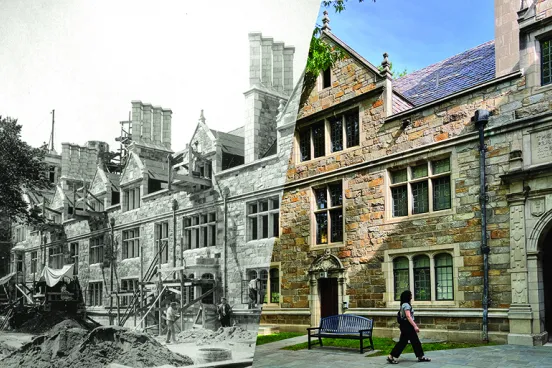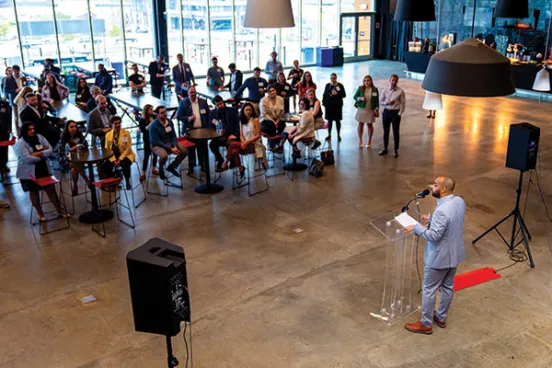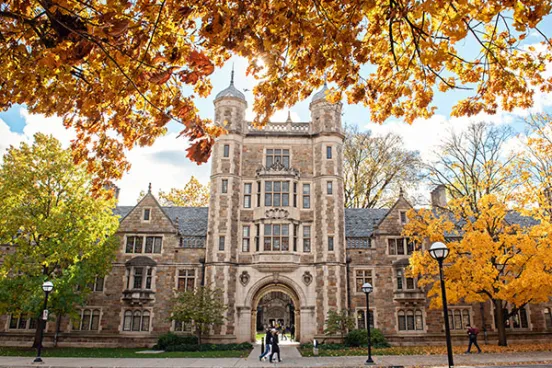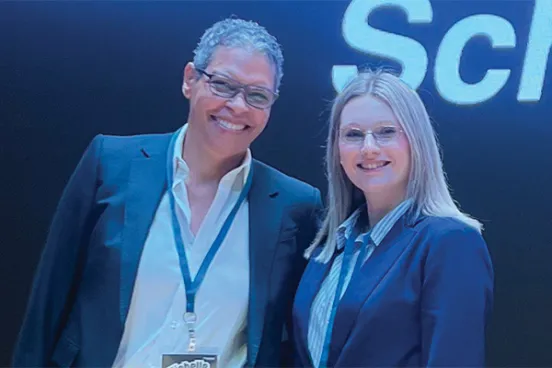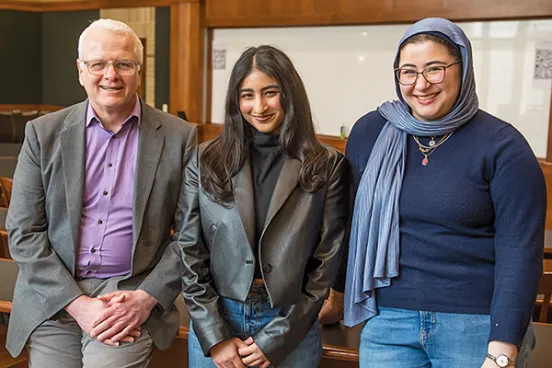For many residents of Los Angeles, the term “affordable housing” is a painful oxymoron. In a city where the median home price nears the $1 million mark, hundreds of thousands of low-income residents lack affordable housing options. And that has an impact on every other aspect of their lives, says Faizah Malik, ’11, managing attorney of housing justice at Public Counsel in Los Angeles.
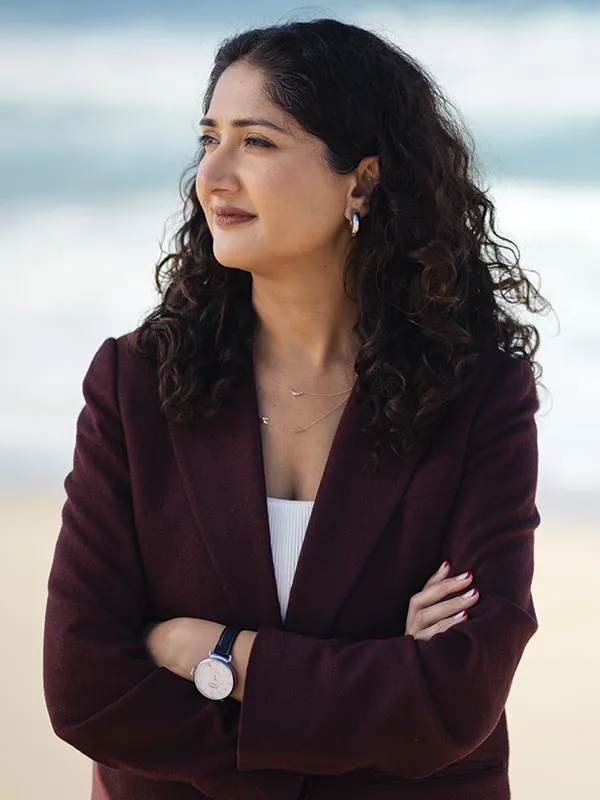
“Housing is such a basic need. It affects your educational outcomes, it affects your health outcomes, it affects your economic outcomes,” she says. “That’s why I think it’s very important to fight for housing to be a human right.”
And she has fought—including a case that returned property to a Black family almost a century after it was wrongfully seized by the government. She also has worked on policy initiatives to keep Los Angeles families in their homes and to generate funds to help address the housing and homelessness crises.
Helping communities advocate
In 2023, Malik’s team helped win the largest expansion of tenant rights in the City of Los Angeles in 40 years. The new protections prevent tenants from being evicted and falling into homelessness. They are now supporting community organizers who advocate to expand rent control and tenant rights across Los Angeles County and successfully defending those wins against constitutional challenges in court with the help of pro bono firm Susman Godfrey.
Malik’s team also helped draft a 2022 ballot initiative, Measure ULA, and now she is defending the law against legal challenges that have arisen since it went into effect in April 2023. Measure ULA instituted a one-time transfer tax on sales of real estate at or more than $5 million in order to provide the City of Los Angeles with a permanent revenue source for affordable housing, rental assistance, and legal services. It is one of the largest transfer taxes for this purpose in the country and in the first year generated more than $170 million in city revenue.
“It has already become an essential funding source for affordable housing for LA, and our hope is that it can be a model for other cities to pass similar funding measures to address housing needs,” says Malik. However, the law was met with opposition from real estate and other industry groups immediately after the ballot proposal passed.
“There were three cases filed to strike down Measure ULA—two in state court and one in federal court,” she says. Working with pro bono partner Irell & Manella, Public Counsel got the federal case dismissed on jurisdictional grounds and then secured dismissal of all 17 causes of action in the consolidated state court cases. Currently, the opponents are appealing to the Ninth Circuit and the California Court of Appeal.
“Our recent tenant rights and Measure ULA wins demonstrate the kind of lawyering our team does at Public Counsel,” Malik says. “We help communities advocate for and achieve transformative policy change, and we will defend those policies in court, too.”
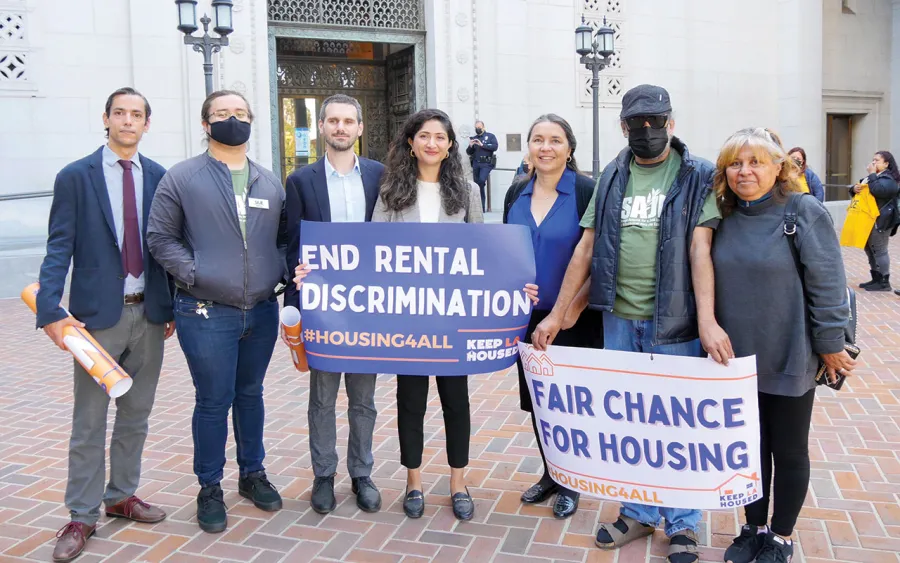
A career in movement lawyering
Malik’s work is very much grounded in movement lawyering—working with communities to advance their goals and build community power using a range of legal tools.
“Sometimes that looks like a policy campaign,” she says. “Sometimes it looks like impact litigation. Sometimes it looks like community education. And sometimes it involves direct client representation. But it’s a framework that is grounded in community needs and goals.” She first became aware of movement lawyering and community lawyering as a theory and practice while at Michigan Law, where she was a student-attorney in the Community Enterprise Clinic. She has returned several times to speak to the clinic about her work.
“My time at Michigan really set the foundation,” she says. “I’ve been a community development lawyer and housing lawyer since I graduated law school.” With Public Counsel, she focuses primarily on housing justice policy and impact litigation and partners with community coalitions of grassroots organizations to push for systemic change.
“Our work is about advancing racial justice and making sure everybody has a roof over their heads.”
Faizah Malik, ’11Housing is such a basic need. It affects your educational outcomes, it affects your health outcomes, it affects your economic outcomes. That’s why I think it’s very important to fight for housing to be a human right.
Reclaiming Bruce’s Beach
Malik combined her impact litigation and policy skills to support the return of Bruce’s Beach to the Bruce family. The popular resort for the Black community in Manhattan Beach, California, was owned and operated by Willa and Charles Bruce between 1912 and 1924. Due to segregation, it was one of the few oceanfront beaches in that area for Black families. Bruce’s Beach faced racist threats and violent efforts from the Ku Klux Klan to drive them away. In 1924, the city took the land through eminent domain under the guise of building a public park. The park did not materialize until 1956, but by then the Bruce family and other Black families had left the city. Manhattan Beach is now wealthy and largely white. It has little affordable housing and a Black population of less than 1 percent.
In 2020, during the racial justice protests that emerged nationwide after the murder of George Floyd, a group of community members in Manhattan Beach began to organize for public awareness surrounding what happened at Bruce’s Beach. They reached out to Public Counsel for help. When Malik learned the history of the land, she saw an opportunity to right a historical wrong and became the first lawyer for the Bruce family.
Public Counsel partnered with the firm Kirkland & Ellis to help with research into the history of the land. In the course of that process, they discovered that, after a series of transfers, the County of Los Angeles owned the land, now the site of the county lifeguard station. The Bruce family, Malik says, wanted their land back—restitution for the income that they had lost over the decades on a parcel of land now worth many millions of dollars—and to hold the government accountable.
After discovering they owned the land, through advocacy, the Los Angeles County Board of Supervisors voted unanimously to return Bruce’s Beach to the descendants of Willa and Charles in 2022. Malik secured the pro bono support of attorney George Fatheree, who was a partner at Munger, Tolles & Olson and later Sidley Austin, to represent the family in the complex transfer negotiation. In 2023, the family sold the property back to the county through an option in the negotiated transfer agreement for $20 million.
The use of eminent domain for racist purposes was not uncommon in the history of the US, Malik says, citing examples such as the seizure of land to build freeways through thriving communities of color. These land use actions helped create segregated communities.
Malik is heartened by recent efforts by governments to explore actions and policies to repair the harms, such as those recommended in the groundbreaking report from the California Reparations Task Force. There is a lot more to do, but Malik says she doesn’t shy away from the hard cases or thorny issues.
“It is very frustrating to see racial injustice, economic inequality, housing insecurity, and homelessness persist in our country,” she says. “But I also am very inspired by the community fighting back, and that is what sustains me and inspires me and why I push for change—because then I feel like I’m part of the solution.”


